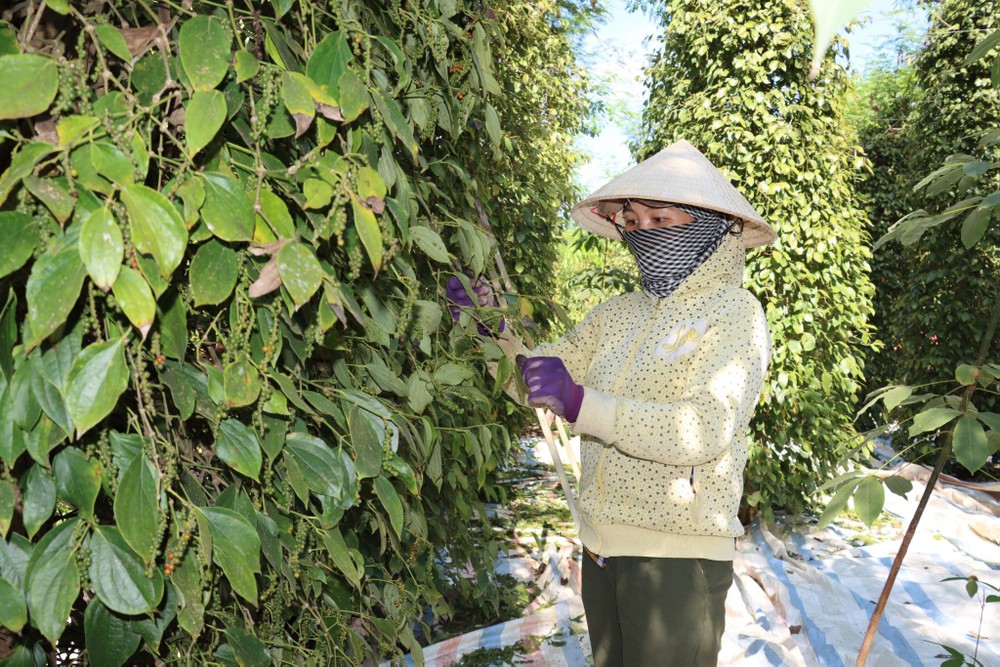
The US, China, and Japan continued to be Vietnam's three largest export markets. However, MARD has urged businesses to implement strict control measures to minimize risks when exporting products to international markets.
Coffee, a leading agricultural export, has been exported to over 80 countries and generated more than $3.1 billion in the past seven months. Chairman Nguyen Nam Hai of the Vietnam Coffee-Cocoa Association said that Vietnam is now the world's largest producer of Robusta coffee - the second largest exporter after Brazil. The far produce of the Southeast Asian country is gaining increasing global recognition.
Export prices of coffee have increased significantly, reaching an average of $3,550 a ton in the first half of this year while it was $2,400 per ton in the same period last year. Pepper is another notable agricultural export. After several years of declining export value, in the first 7 months of 2024, Vietnam exported about 162,000 tons of pepper, bringing in $746 million.
Meanwhile, statistics from the Vietnam Fruit and Vegetable Association show that in the past seven months, Vietnam's fruit and vegetable export value is estimated at over $3.8 billion, a 23.4 percent increase compared to the same period in 2023. In 2024, Vietnam's fruit and vegetable exports are expected to reach $7 billion, a record high in recent years.
This shows that the quality of Vietnamese fruits and vegetables is improving and meeting the requirements of export markets, said General Secretary Dang Phuc Nguyen of the Vietnam Fruit and Vegetable Association. According to Mr. Nguyen, in addition to traditional markets such as China, South Korea, and Japan, Northeast Asia is a strategic market for Vietnamese fruits and vegetables in the future.
Despite the positive growth in agricultural exports, experts have advised businesses to pay more attention to quality to meet the increasingly high demands of international markets.
At a conference organized by MARD in Ho Chi Minh City in early August, Deputy Director Ngo Xuan Nam of Vietnam Sanitary and Phytosanitary Notification Authority and Enquiry Point (Vietnam SPS) under MARD, shared that in the first six months of this year, Vietnam recorded an abnormal increase in the number of warnings from the European Union (EU), with a total of 57 warnings, an increase of over 80 percent compared to the same period in 2023.
The increase in these warnings has led the EU to increase the frequency of border checks on agricultural exports from Vietnam. Currently, four agricultural products are subject to stricter controls, including dragon fruit, chili peppers, okra, and durian. The EU periodically reviews and implements enhanced inspection and import management measures every six months. Therefore, without timely solutions, Vietnam’s agricultural exports risk facing increased border checks under EU regulations, affecting export processes and the country’s competitiveness in the international market.
To ensure that agricultural and aquatic products exported from Vietnam to the EU do not encounter food safety issues, the SPS Vietnam Office advises businesses to pay attention to controlling substances and microorganisms as recommended by EU warnings.
Mr. Luong Ngoc Quang, from the Department of International Cooperation and Communication, Plant Protection Department under the Ministry of Agriculture and Rural Development, stated that when a product is accepted by a new market, it opens up opportunities to increase export turnover and affirm the position of Vietnamese agricultural products.
However, he stressed that the process of business negotiations in a new market takes a lot of time and effort. For some products, the negotiation and risk assessment process can take 3-5 years, or even longer, to sign a protocol. Therefore, once the market is opened, producers and exporters must strictly comply with the standards set by the importing country to avoid the situation of “one bad apple spoiling the bunch.”
In the first half of 2024, the RASFF (Rapid Alert System for Food and Feed) recorded a total of 2,708 warnings, of which Vietnam received 57 warnings, accounting for 2.1 percent. Although this rate is average compared to other countries in the region, it shows a significant increase compared to the 67 warnings Vietnam received from the EU for the entire year of 2023.
























